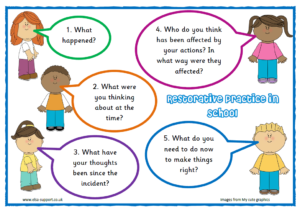Humans are hardwired to connect and build relationships. How do we learn this? Just like everything else – observing, mimicking, trial and error, and lots of practice.
Here at WCS, we use a restorative approach to preventing harm and resolving conflict with children so they learn the impact of the harm they cause and how to take steps to put it right. This puts compassion and empathy at the forefront rather than reacting to mistakes children make with punitive actions. Out children understand they are members of a community – a connected part of something greater than themselves – and their words and actions impact that community, which, in turn, impacts them.
Restorative practice has been shown to have a wide range of benefits in schools, including increased attendance and reducing exclusion, as well as alleviating problem behaviors such as bullying, classroom disruptions, and truancy.
For us, it is simply the right thing to do, based on our philosophy and practice. Our mission to educate children to become confident, responsible, and compassionate people means we directly teach skills children need to become good people. Restorative practice is a vital component of that.
Here is our “cheat sheet” that all faculty and staff have on hand to assist us in working with children in conflict.
Check out a video of this process in action.




